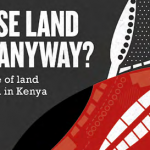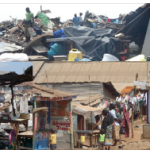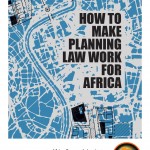Irene Karanja is Executive Director of Muungano Support Trust (MuST) – a Kenya-based federation of slum dwellers which works with the urban poor. Through organising savings schemes and community-led enumerations, MuST works to articulate the needs of people living in informal settlements. In this interview with ARI’s Hannah Gibson, Irene discusses the anti-evictions movement in Kenya, the origins of MuST and the federation’s partnership with the University of Nairobi.
What is Muungano Support Trust?
Muungano Support Trust (MuST) is the secretariat of a federation of slum dwellers in Kenya, also known as Muungano wa Wanavijiji. The federation is a membership organisation that mobilises people to participate in saving schemes and community-led enumerations. It represents more than 64,000 members in 300 informal settlements in 15 counties. The federation started in 1996-97 as a movement to resist unlawful evictions, landgrabbing and discrimination experienced by slum dwellers, but it has evolved to engineer community-led planning solutions to poverty and underdevelopment. The main objective is to improve the dignity and well-being of all residents of informal settlements.

MuST comprises a small group of professionals that includes planners, architects, sociologists, accountants and journalists. They help members of Muungano wa Wanavajiji to secure better housing, tenure, adequate infrastructure and viable livelihoods. Their work is supported by Akiba Mashinani Trust (AMT), the financing facility of the federation, which invests in more ambitious infrastructure upgrading and sustainable housing projects.
Why are saving schemes so important in informal settlements?
Money mobilises people. It is at the forefront of everyone’s minds in informal settlements. Historically, the urban poor had next to no access to financial services. Banks and microfinance institutions would charge exorbitant fees when offering credit. For instance, I can recall people seeking a loan of 1000 Kenyan shillings (Ksh) ($12) and being asked to pay Ksh500 just to submit an application.
Also Read: A brief history of exclusion
Since the mid to late 1990s, community-led saving schemes have been offering residents in informal settlements the opportunity to pool their money safely at a rate that is affordable. They are then able to invest in public goods beyond the scope of any one individual or family. For example, communities are able to pay for the fees and taxes associated with making claims over government-owned land. This kind of mechanism was never previously available. Over time, saving schemes have become more sophisticated, with many offering interest on deposits.
Saving schemes encourage democratic and accountable governance. People come together at the point of collection to share views and thoughts on issues that affect their daily lives. Members actively participate in deciding how money will be spent. When people make a financial investment, they are determined to receive something in return. People are very clear about what they want.
When comparing a settlement that has a saving scheme with one that does not, you quickly notice that the differences in terms of infrastructure and access to services are vast. Saving schemes also unite people in their locality, and transcend ethnic, cultural and regional differences.
What data does MUST collect?
There is a saying at MUST – the middle class acquire knowledge in classrooms, while the poor learn by visiting each other. It is only by visiting a community that we can understand what finance is needed or what housing solution to employ. Local people are the experts and we must trust them to be involved in decision making.
The federation undertakes regular household surveys and enumeration exercises. To plan infrastructure development and service delivery properly, we need access to reliable data. This includes information about how long people have lived in a particular location, where they come from, what services they have access to, and how they occupy their time. We also map what goods and services exist in a particular settlement, and where they are located, using a geographic information system, or GIS.
Also Read: Addressing informality through urban planning education
Government planners initially showed very little interest in our data, claiming that it was unreliable and collected by untrained personnel. However, the Department of Urban Planning at the University of Nairobi realised it was not every day that poor people organise themselves to undertake regular censuses. They saw the potential of what we were doing. We offered them unprecedented access to areas and people usually neglected by planning students and practitioners. In return, students from the university assist our enumerators to collect more robust information.
How is this information used?
Our partnership with the University of Nairobi has enabled the data collected by slum dwellers to be used to inform primary research on informality and the urban sprawl. MuST invests heavily in partnerships with universities in order to influence research and policy. Financial support from the Rockefeller Foundation has enabled MuST to devise and deepen practical, community-driven solutions to urban poverty.

Kosovo settlement in Nairobi’s Mathare slum in Nairobi was the first area to participate in an “urban studio” with the University of Nairobi. The resulting plan provided access to constant piped water for each of the 3,000 households in Kosovo. The Nairobi Water and Sewer Company installed new water pipes on the agreement that the community members maintained the service and paid their water bills.
Settlement-by-settlement solutions are not the answer. We must think bigger. MuST, in partnership with the University of Nairobi and University of California, Berkeley, has published the Mathare Zonal Plan, an integrated infrastructure blueprint for all 13 settlements in Mathare. It is a collaborative plan that emerged out of local surveys, and incorporates the aspirations of the residents. It is the first urban development plan of its kind in in Nairobi.
By scaling up we bring together local knowledge, improve efficiency and increase the bargaining power of the urban poor in negotiations with government. In time, we hope that the plan will form the basis of a larger city council master plan to upgrade Mathare, and thereby influence the direction of urban planning in Kenya.
By Hannah Gibson, Policy Researcher at Africa Research Institute












